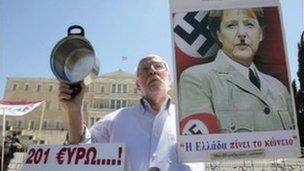Germany: Europe's indispensable power
- Published
- comments
How Germany became Europe's indispensable power
Germany - the most successful economy in Europe - has become Europe's paymaster since the eurozone crisis broke out. But how do they feel about it in Germany? For The Editors, a programme which sets out to ask challenging questions, I decided to find out.
For years it has been the German creed: a European Germany and not a German Europe.
And yet Germany, with its Wirtschaftswunder - its economic miracle - now finds itself Europe's indispensable power.
Its political class did not seek this role, but in Europe today no major decision can be taken without reference to Germany.
It is one of the great ironies of the eurozone crisis that the single currency, which was designed to bind Germany more closely into Europe, has ended up confirming Germany's strength. For many Germans this remains an uncomfortable truth.
The Foreign Minister, Guido Westerwelle, recently told his compatriots: "I warn us against any form of Teutonic snootiness."
The Finance Minister, Wolfgang Schaeuble, said the German economy was "a source of pride" - but he felt compelled to add "not smugness".
For decades Germany had pretended to be less influential than it was. Some wanted the country to be a kind of Greater Switzerland.
All of that disappeared with the eurozone crisis.
As one German paper said: "They're suddenly realising that the world is relying on them to save the euro and avert a disaster for the global economy."
The article continued: "The Germans are going through a crash course in being a leading power."
It has been a painful process. Initially the Germans were criticised for acting too slowly.
They were accused of putting the interests of German taxpayers above the rest of Europe, of lacking solidarity.
Then events - and American pressure - nudged Chancellor Angela Merkel into action.
She backed a bail-out of Greece and the setting up of a giant rescue fund - but Germany insisted a price would have to be paid.

Some Greek opponents of austerity have resorted to anti-German stereotypes
Weak countries needed rescuing and the biggest burden fell on Germany. They did not want the role of Europe's paymasters and so a grand bargain emerged.
Berlin would help the countries of southern Europe but, in exchange, they would have to cut costs and embrace reforms. In other words, become more like Germany.
Mrs Merkel and Mr Schaeuble had been influenced by how the economy of the former East Germany had been revived.
They believed there was no other route to economic health than by controlling and cutting budgets and reforming labour laws - making it easier to hire and fire.
As wages were cut and unemployment rose in many parts of southern Europe it stoked resentment.
Berlin, as much as Brussels, is seen as the author of this policy.
On the streets of Athens, Madrid, and Rome Mrs Merkel has been depicted as Hitler. It seemed to bear out the warning from the former German Chancellor, Helmut Schmidt, that: "If we let ourselves be seduced into taking a leading role in Europe, our neighbours will brace themselves against us."
Germany's standing in Europe will depend on results.

Bailing out the rest of Europe has not stopped a construction boom in Germany
The government in Berlin has staked its reputation on urging countries to cut budgets and to find growth through exports and freeing up labour markets. The jury is still out.
The date when growth will return is forever being pushed back into the future. The argument has not been settled as to whether this policy will give birth to a more competitive Europe or whether it has locked some countries into a cycle of decline or stagnation.
It does not help that the International Monetary Fund has raised serious doubts about the bail-out of Greece. The international economic agency OECD reckons private demand has fallen by 33% in Greece.
The austerity believers have lost some of their faith.
The European Commission has become much more flexible over countries failing to meet targets for cutting deficits.
Suddenly - at least in public - unemployment has become of greater concern than debt. At a recent conference in Paris, Mr Schaeuble spoke of the risk of losing the struggle for European unity if unemployment remained high.
So the Germans, rather suddenly, announced a series of bilateral deals with countries like Spain, Portugal and Greece to help young people.
Germany plans to invest more than a billion euros (£850m) in funding apprenticeships and training in Germany. Berlin understands it needs to win friends in Europe.
Polls suggest that as much as some of Germany's policies are resented, the country remains much admired and respected.
Events and its automotive-based economy have handed Germany enormous power.
The paper Die Welt opined that: "Scarcely a people is less suited to this task than the contrite Germans."
Maybe, but Germany will have to tread softly.
BBC News: The Editors features the BBC's on-air specialists asking questions which reveal deeper truths about their areas of expertise. Watch it on BBC One on Monday 24 June at 23:20 BST or catch it later on the BBC iPlayer or on BBC World News.